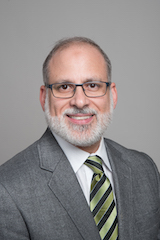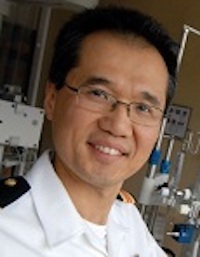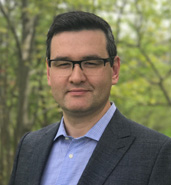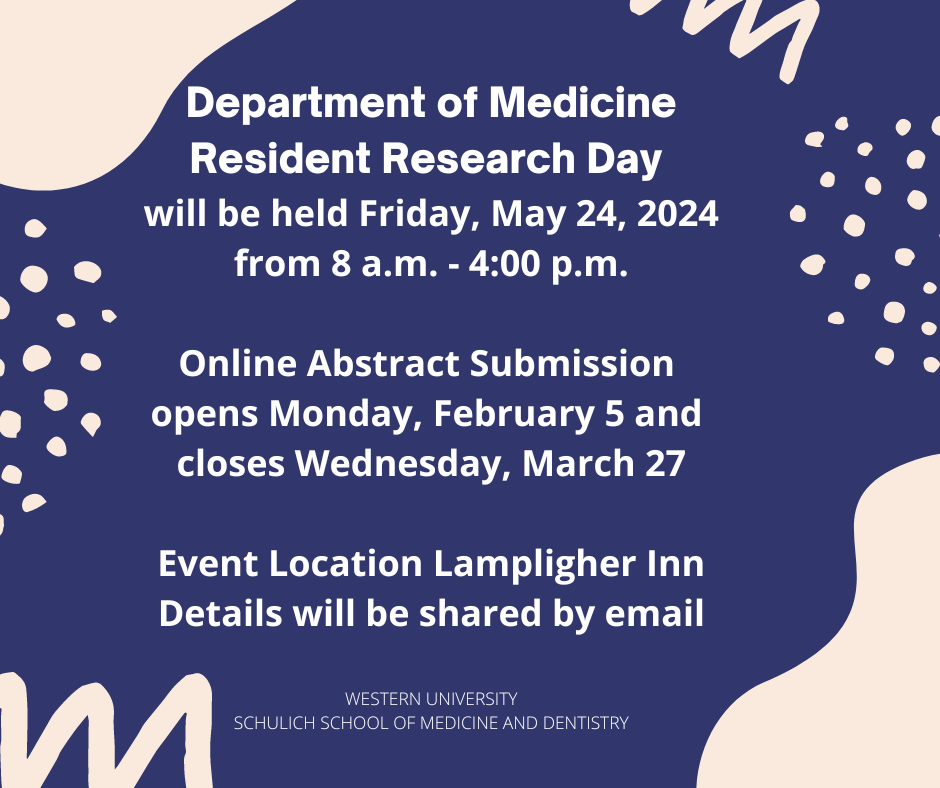| Critical Care Medicine ian.ball@lhsc.on.ca |
|||
 IAN BALL, MD, MSc (Epi), FRCPC, Associate Professor IAN BALL, MD, MSc (Epi), FRCPC, Associate Professor Education MD UWO 2002 FRCPC (Emergency Medicine) UWO 2007 Fellowship in Critical Care, UWO 2008 Fellowship in Clinical Pharmacology and Toxicology, University of Toronto 2010 MSc (Clinical Epidemiology), University of Ottawa - 2016 Research Interests Dr. Ball spends his clinical time as an ICU consultant in the Critical Care Trauma Center at Victoria Hospital and as a Consultant Physician with the LHSC Regional Trauma Program. Dr. Ball is the Chair of Critical Care Western Research. He is an active member of the Canadian Critical Care Trials Group. His research interests include: trauma, end of life care and toxicology Keywords: End of life care Toxicology Trauma | |||
| Critical Care Medicine john.basmaji@lhsc.on.ca |
|||
 JOHN BASMAJI, MD, FRCPC, Assistant Professor JOHN BASMAJI, MD, FRCPC, Assistant ProfessorBio sketch and keywords unavailable. | |||
| Critical Care Medicine karenj.bosma@lhsc.on.ca |
|||
 KAREN J. BOSMA, MD, FRCPC, Associate Professor KAREN J. BOSMA, MD, FRCPC, Associate Professor Dr. Bosma completed her undergraduate work at McMaster University, graduating from the Arts & Science Programme (B. Arts Sc) and subsequently from the McMaster Medical School Program (MD). She then did a residency in Internal Medicine followed by a combined fellowship in Respirology and Critical Care Medicine at Western University. In 2004-2005, Dr. Bosma spent twenty months at the Universita di Torino, Italy doing a Research Fellowship with Professor Marco Ranieri. While in Italy, her research was focused on the relationship between patient-ventilator interaction and sleep quality and she was also involved in studies on acute lung injury in brain-injured patients and the impact of ventilation practices on lung function in potential organ donors. In 2006, Dr. Bosma started her clinical practice in the Department of Medicine, within the Divisions of Respirology and Critical Care Medicine at the Schulich School of Medicine & Dentistry, Western University. She is an Attending Consultant in the Medical-Surgical Intensive Care Unit, LHSC University Hospital and on the Critical Care Outreach Team. Dr. Bosma’s research work continues to focus on patient-ventilator interaction, and its impact on sleep quality and weaning from mechanical ventilation. Her work on sleep in the intensive care unit has led her to examine delirium. She was a successful co-applicant for an AMOSO grant which supported a 3 year quality improvement initiative to establish routine delirium screening in the intensive care unit. She was also the site PI for the OSCILLATE study, a multicentre, CIHR-funded randomized controlled trial examining the use of high frequency oscillation for severe, early acute respiratory distress syndrome. Dr. Bosma is an author of three book chapters and ten peer-reviewed publications. Keywords: Delirium Mechanical ventilation Patient-ventilator dyssynchrony Patient-ventilator interaction Sleep | |||
| Critical Care Medicine whaddar@uwo.ca |
|||
 WAEL HADDARA, MD, BSc. Pharm , FRCPC, Associate Professor, Chair, Division of Critical Care WAEL HADDARA, MD, BSc. Pharm , FRCPC, Associate Professor, Chair, Division of Critical Care Dr Haddara is the Chief of Critical Care at London Health Sciences Center and Chair of the Division of Critical Care Medicine. He previously served as the Medical Director of the Medical/Surgical ICU at University Hospital and was the inaugural Physician Lead for the Critical Care Outreach Team. He holds a Masters in Medical Education from Dundee University and has been actively involved with the Center of Education, Research and Innovation (CERI) at Schulich School of Medicine. His program of research examines core ideas and values in Medicine that are often thought of as timeless or intrinsic such as interprofessional collaboration and altruism. He draws on critical research methods such as critical discourse analysis and genealogical analysis to uncover tensions within those concepts. Dr Haddara holds Royal College certification in Internal Medicine, Endocrinology and Intensive Care. He previously trained and worked as a pharmacist, and continues to hold registration (Register B) with the Ontario College of Pharmacists. London has been his home since 1999. Keywords: Altruism Endocrine aspects of critical illness Medical education Professionalism | |||
| Critical Care Medicine Raymond.Kao@lhsc.on.ca |
|||
 RAYMOND KAO, MD, FRCPC, Professor RAYMOND KAO, MD, FRCPC, Professor I was appointed to the Faulty in September 2003 as Assistant Professor in the Department of Medicine. In addition to regular commitment to teaching at the undergraduate (medical students) and graduate (residents and fellows) teaching level, I have established a clinical training program for the Canadian Armed Forces’ military physician assistants (PA) to do their clinical phase training at The University of Western Ontario starting in 2004. At the present time the trainees do their rotations in Trauma, Internal Medicine, General Surgery, Orthopedics, Sports Medicine, Urology and Psychiatry. Effective academic year 2007-2008 two new rotations, ENT and Anesthesia, were added to the clinical phase. Now in its fifteenth year at Western University, it has been well received not only by the trainees, the military hierarchy but also by the faculty. The PA clinical training at London enhanced the students’ knowledge and experience in caring of the wounded and the sick in the war zone such as Afghanistan, Iraq and other peacekeeping missions around the world. This program also helped the hospitals affiliated with the Western University to be involved with a new pilot program established by the Ontario Ministry of Health to establish PA in the various hospitals in Ontario. My research activities consisted of both animal and clinical studies with collaboration in both areas. The animal studies of particular importance related to erythropoietin (rHuEPO) and C-Peptide therapy in septic and hemorrhagic shock. As principal investigator for the initial established rHuEPO in septic mice resulted in an abstract oral presentation in the 9th World Congress of Intensive and Critical Care Medicine followed by its publication in Critical Care journal. The positive results from the septic mice model have prompted new clinical research of the effect of rHuEPO in septic patients in the ICU and this project is in progress. In my lab I have further developed a rHuEPO on hemorrhagic shock rat model in which became an award winning abstract oral presentation at the European Society of Intensive Care Medicine in Berlin. At the present time we are also looking at the effect of C-Peptide in a hemorrhagic shock and resuscitation rat model. I am also involved in large data analysis for the intensive care unit. I published a 24-hour mortality prediction model using logistic regression analysis on 8822 patient observations. At the present our group is performing an external validation of the proposed model using the Critical Care Information System (CCIS) dataset across all Level III ICUs in Ontario. Keywords: Hemodynamics Hemorrhagic shock Microcirculation Resuscitation Sepsis Tissue oxygenation Ventilated trauma patients | |||
| Critical Care Medicine Aleks.Leligdowicz@lhsc.on.ca |
|||
 ALEKSANDRA LELIGDOWICZ, MD, DPhil, FRCPC, Assistant Professor ALEKSANDRA LELIGDOWICZ, MD, DPhil, FRCPC, Assistant ProfessorDr. Leligdowicz is a clinician scientist in the Department of Medicine in the division of Critical Care Medicine. She completed a medical degree at McGill University and a PhD at Oxford University in human HIV immunology in West Africa. Following residencies in internal medicine (UBC) and adult critical care (UofT), she pursued her interest in immunology and severe infection as a postdoctoral research scholar at the UCSF. Her laboratory at Robarts Research Institute uses cellular and molecular tools to study biological samples from patients admitted to the Intensive Care Unit (ICU) to understand the mechanisms contributing to the regulation of inflammation in severe infection Leligdowicz Lab . The focus of her research is translational biology of immune dysregulation and endothelial injury in early sepsis. The goal of her research is to understand pathology of sepsis and improve the diagnosis and personalize treatment of this complex syndrome. Keywords: ARDS Biomarkers Critical Care Endothelial Injury Immunology Sepsis | |||
| Critical Care Medicine mithu.sen@lhsc.on.ca |
|||
 MITHU SEN, MD, FRCP(C), BSc, Professor MITHU SEN, MD, FRCP(C), BSc, ProfessorDr. Sen is Associate Professor Medicine, Divisions of Respirology, Critical Care & Sleep Medicine, Schulich Medicine & Dentistry (SSMD). She has been extensively involved in undergraduate, postgraduate, and continuing professional development since 2004. She has been Director of Undergraduate Education, Postgraduate Education, Program Director in Critical Medicine (Adult), and is the founding Chair of the Canadian Critical Care Review Course. She has been Assistant Dean, Faculty Equity and Wellness since 2014. In this role, she has been the Chair of the Mentorship Oversight Committee, the Faculty Affairs Advisory Committee and the Faculty Wellness Committee. Her leadership created an international peer reviewed award winning Association of American Medical Colleges (AAMC) Faculty Wellness Program in 2016 and 2017. Dr. Sen serves on The Associated Medical Service (AMS) Board of Directors, which oversees many aspects of education nationally including History of Medicine (including Hannah Chairs) and the award winning AMS Phoenix Project. She is an experienced Royal College of Physicians & Surgeons of Canada (RCPSC) appointed external surveyor for postgraduate training programs nationally. She is recognized nationally for her expertise in accreditation of academic institutions and training programs. She was serves on Fellowship Affairs Committee, along others (RCPSC). Her experience in health care and hospital systems, having been on the Board at London Health Sciences Centre (LHSC), Professional Staff Organization (PSO) President, and Medical Advisory Committee member, as well as Chair of LHSC Resuscitation Committee for more than 10 years, gives her experience significant breadth. She has been instrumental in developing health policy locally and nationally since 2008. Her experience as an educator and her influence is sought after in national projects and policies, including those setting precedence in the Canadian health care system, including the Fatigue, Risk, Excellence: A PanCanadian Consensus on Resident Duty Hours, published (2013), where she was recruited to serve on the Medical Education Expert Working Group (EWG) and contributing author as well as currently on the Fatigue Risk Management EWG. Dr Sen was recruited in 2011 to The CanMEDS 2015 Project, to write milestones and elements in The Scholar, Life Long Learner EWG as a core member and a contributing author. This work is the fabric of all specialty and subspecialty program to translate into the CBME program. She has been continuing this work by writing Entrustable Professional Activities (EPA’s) at RCSPC. She was trained as trainer in the first RCPSC ASPIRE (Advancing Patient Safety in Residency Education. She was elected Chair of the Association of Faculties of Medicine of Canada Physician Health and Wellness Group, bringing undergraduate, postgraduate, and faculty affairs, work in this area and leading this initiative nationally. She is an integral member of RCPSC Steering Committee National Physician Health Strategy. She was an invited speaker at Canadian Medical Association (CMA) Canadian Conference on Physician Health (CCPH) 2017. She serves on the national RCPSC Specialty Committee, and is the Director of Education for The Canadian Critical Care Society. She serves on the curriculum Planning Committee and chaired the Ontario Thoracic Society (OTS) Better Breathing Conference in 2016. She has also been an instructor for Crucial Conversations (VitalSmarts) for a decade. Dr. Sen received The Cameron Gray Award (OTS) in 2000, Junior Teaching Award of Excellence in the Department of Medicine in 2008, and Dean’s Award of Excellence for Postgraduate Education in 2013. She received the AAMC “Best in Class International Award” in 2016 & 2017, for her leadership at SSMD in faculty vitality & wellness, resilience, and work life integration. The Group on Faculty Affairs (GFA), AAMC is the international expert group in Faculty Affairs, thus great honour to win this peer reviewed international award two years in a row (2016 & 2017). This innovative work was the creation of a faculty wellness program at SSMD, Western University, that led to this prestigious international recognition of our University as a lead in this area of faculty affairs. Keywords: Sleep and delirium in the ICU Sleep and mechanical ventilation | |||
| Critical Care Medicine marat.slessarev@lhsc.on.ca |
|||
 MARAT SLESSAREV, MD, MSc, FRCPC, Assistant Professor MARAT SLESSAREV, MD, MSc, FRCPC, Assistant ProfessorDr. Marat Slessarev is a clinician-scientist in the Division of Critical Care. He completed his HonBSc, MD, MSc in Physiology and post-graduate training in Internal Medicine at the University of Toronto, followed by fellowship in adult Critical Care Medicine and a PhD in Medical Biophysics at Western University. Dr Slessarev works as a Consultant Intensivist at Critical Care Trauma Centre and Medical Surgical Intensive Care Unit at LHSC and as a Regional Medical Lead (Donation) at Ontario Health (Trillium Gift of Life Network). His research is focused on clinical innovation at the intersection of neurosciences, critical care and organ donation. He co-leads the following studies/programs of research: 1) NeuPaRT (Neurologic Physiology after Removal of Therapy) program of research seeks to measure when brain activity stops relative to circulatory arrest during the dying process after removal of life support, and interpret these findings from the ethical, legal, and policy lenses to inform the timing of death determination in deceased organ donation; 2) SAVE program of research (https://saveicu.com) that seeks to advance sedation practices in critical care, in part through its flagship SAVE-ICU RCT - a pragmatic open-label multicentre trial comparing the effect of sedation with inhaled (intervention) vs IV (control) sedatives on patient (mortality, quality of life) and health system (duration of ventilation, ICU stay) outcomes in patients with respiratory failure; and 3) ABOVE (Advancing Brain Outcomes in pediatric critically ill patients sedated with Volatile AnEsthestic Agents) - a pilot multicentre RCT assessing if sedation with inhaled anesthetics vs IV sedatives improves neurocognitive outcomes in paediatric patients; 4) Normothermic Regional Perfusion (NRP) – a new intervention that reconditions donor organs after circulatory determination of death but prior to transplantation by selectively recirculating oxygenated blood to abdominal (A-NRP) or thoraco-abdominal (TA-NRP) organs. While practiced in Europe and USA, NRP has not been adopted in Canada due to concerns regarding violation of death determination criteria and potential for donor harm (via resumption of brain blood flow and sentience). Dr Slessarev co-leads provincial interdisciplinary working group that aims to address these challenges and safely implement this method in Ontario. Keywords: Critical Care Innovation Neurocognition Organ Donation Sedation | |||
| Critical Care Medicine cweijer@uwo.ca |
|||
 CHARLES WEIJER, MD, PhD, Professor CHARLES WEIJER, MD, PhD, ProfessorDr. Charles Weijer is a bioethicist and Professor of Medicine, Epidemiology & Biostatistics, and Philosophy. He is an internationally recognized expert in research ethics. His publications on the duty of care in clinical research, the ethical analysis of study benefits and harms, and empowering communities in research have been broadly influential. From 2008 to 2013, Dr. Weijer co-led a collaboration that produced the first international ethics guidelines for cluster randomized trials. From 2014 to 2018 he collaborated with Dr. Adrian M. Owen on a project exploring the ethics of functional neuroimaging after severe brain injury. Dr. Weijer led the writing team for the World Health Organization’s guidance on “Ethical Considerations for Health Policy and Systems Research,” published in 2019. In 2020, he served on the WHO Working Group for Guidance on Human Challenge Studies in COVID-19. Dr Weijer is currently working with Dr. Marat Slessarev and an interdisciplinary team to explore the ethics of research involving imminently dying patients, and ethical issues in organ donation, including the use of normothermic regional perfusion. Dr. Weijer held the Tier 1 Canada Research Chair in Bioethics from 2005 to 2019. In 2014, he received Western’s Hellmuth Prize for Achievement in Research, and, in 2016, he was elected to the Royal Society of Canada. Keywords: Controlled human infection models Organ donation Randomized controlled trials Research Ethics | |||


